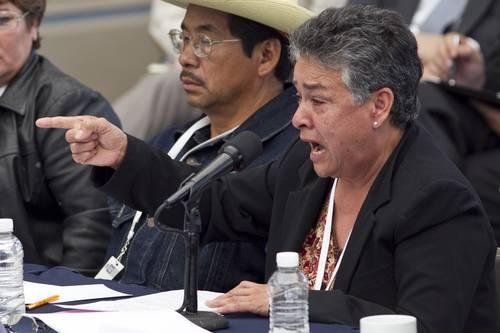Last Thursday, President Felipe Calderón held a highly publicized encounter with several victims of the extreme violence that has accompanied his ongoing war against drug trafficking and organized crime. The victims were members of the Movement for Peace with Justice and Dignity, a movement that has organized a series of high-profile marches and caravans to call attention to the widespread suffering that has followed in the wake of Calderón’s militarization of the drug war. The movement is led by a poet named Javier Sicilia, who announced he was giving up poetry to become a full-time anti-violence activist when his 24-year-old son, together with six companions, was murdered in Ciudad Juárez three months ago.
His movement follows in the footsteps of other “apolitical” movements organized by the parents of murder victims. Those movements, organized to make Mexico “safe,” have become institutionalized civic associations called Observation System for Security, and the Association to Stop Kidnapping.
Sicilia has argued that Mexico can only be made safe if it is fundamentally transformed. The president has nothing to fear from us, he remarked before the dialogues. We are not a political movement; we do not seek political power. A Ghandian Catholic activist with roots in liberation theology, Sicilia says he wants to reconstruct—no small task—the social fabric of Mexico.
His movement had been divided about the wisdom and usefulness of a public meeting with Felipe Calderón, at least until the president agreed to the group’s principal demand, the demilitarization of his war against organized crime, during which some 40,000 people have been killed. But Sicilia prevailed over his reluctant compañeros with the argument that “pain had no ideology, no agenda, only a demand for justice.”
He says he is anxious to “humanize” the conflict between the anti-violence activists and the institutions of the state, getting the president to see the victims as real, suffering people and not simply collateral damage of a failed (or criminal) policy. In that context, he said he let many of the president’s controversial remarks go unchallenged during the four-hour session. He said he lamented Calderón’s “stubbornness,” but “if we had fallen into provocation,” he later told reporters, “it would have been a dialogue of the deaf.”
He didn’t succeed in announced goal of getting Calderón to apologize for the inordinate number of deaths and disappearances that have occurred on his drug-war watch, but he did get the president, and a portion of his cabinet, to listen to tales of suffering. And he got the president to admit that while he could think of no other way to confront the rising force of organized crime, his strategy wasn’t working so well.
“I am open to revising the strategy,” said Calderón at one point, “but, really, there is no clear alternative…I think we have to continue in this; combating the criminals and reconstituting the social fabric.” But there was no apology. If anything, responded the president, “I apologize for not having deployed federal forces sooner.”
The meeting at Mexico City’s Chapultepec Castle, was celebrated by many for its openness, and for its frank expressions of dissent—even for bringing the president, not known for his mingling with the people, out of his “bubble.”
It was criticized by other observers for its failure to change—or even, on the president’s part, to acknowledge—a failed policy. Still others saw it as mere theater, and even a stage for its protagonists to grandstand, allowing Calderón to show his compassion for the victims—even embracing the grieving mother of four disappeared children—while promising nothing.

The grieving mother, María Elena Herrera (see photo), of the state of Michoacán, said she spoke in the name of thousands of mothers who lived with “the pain of the disappearance of their children, and who now suffered the damages of this war.” She spoke of the disappearance of four of her own children, and of the country’s deaths and disappearances with one constant: the collusion of criminal groups with public security forces at the federal, state and municipal levels.
Sicilia picked up the theme: “The problem, Mr. President, is that you think the evil forces are outside and the good people are within. The problem, Mr. President, is that you have launched a war with rotten institutions, which give the nation no security and which contain high levels of impunity.”
One of those institutions, certainly, is the military, thoroughly infiltrated by criminal organizations that want to control territory, to become legitimate authorities, to make their own laws, to enforce their own rules.
Calderón certainly understands the rottenness at the core of many of the country’s institutions; his National Action Party (PAN) has long campaigned against that rottenness, attributing it to the still-powerful Institutional Revolutionary Party (PRI), which ruled Mexico for some seven decades. And after Thursday’s dialogue, Calderón may even understand the deepening dimensions of the human suffering caused by his “war.” But on Friday, the day after the “dialogue,” he dispatched 2,700 federal troops to several locations in the state of Tamaulipas to “reinforce public safety.”
Was the “dialogue” a failure? Or was it the first step in a very long march—or caravan?

